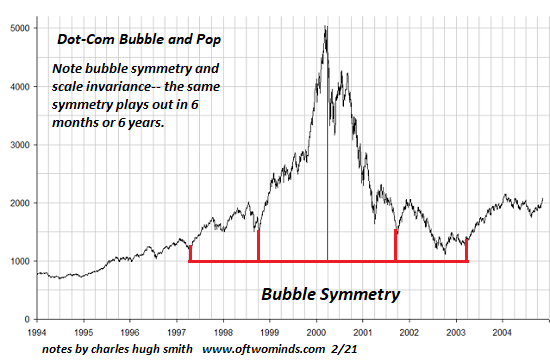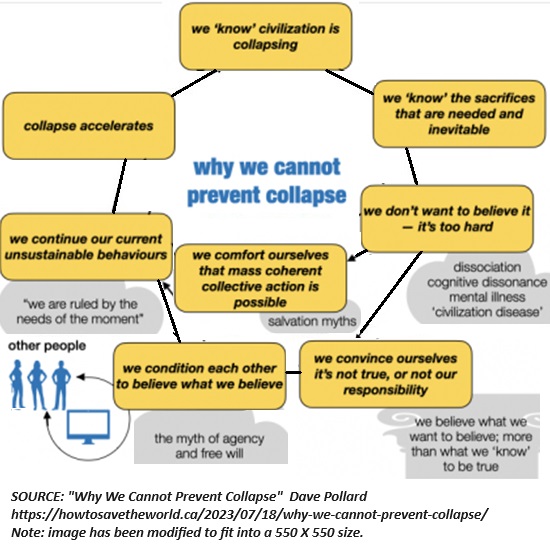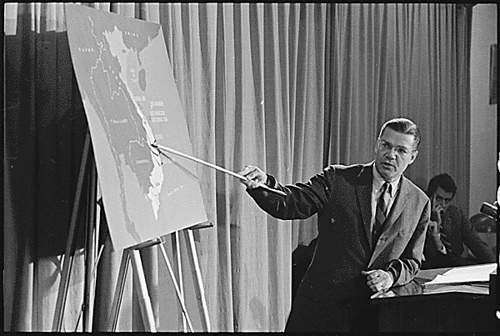The current narrative holds that the big problem we need to solve is conjuring up cheap energy to power AI data centers. Fortunately for us, the solutions are at hand: building modular nuclear power plants at scale and tapping North America's vast reserves of cheap natural gas.
Problem solved! With cheap energy to power all the AI data centers, we're on a trajectory of fantastic growth of all the good things in life.
Let's consider the implicit assumptions buried in this narrative.
1. The unspoken assumption here is AI will solve all our problems because it's "smart." But this assumes the problems are intellectual puzzles rather than self-reinforcing, self-destructive structures fueled by corruption and perverse incentives embedded in the system itself.
2. The assumption is that if we replace human workers with apps and robots, that will automatically generate Utopia. But this is based on a series of baseless, pie-in-the-sky assumptions about human nature and the nature of social and economic structures.
3. The assumption is that being "entertained" by staring at screens all day is the foundation of human fulfillment and happiness, and so getting rid of human work will usher in Nirvana. The reality is humans are hard-wired to find fulfillment in purposeful, meaningful work that is valued by others. Staring at "entertainment" on screens all day isn't fulfillment, it's deranging and depressing.
This is human nature in a nutshell: Idle hands are the devil's workshop.
4. Another assumption is that every technological revolution generates more and better jobs by some causal mechanism. But there is no law of nature that technology inevitably creates more jobs than it destroys, or that the resulting jobs are more rewarding. That recent history supports this idea doesn't make it a causal law of nature. By its very nature, AI destroys jobs while generating few replacement jobs.
The handful of top AI programmers are paid (or promised) millions of dollars; the industry doesn't need more than a handful of top designers because AI can generate its own conventional coding.
5. This narrative assumes AI will be immensely profitable and the profit motive will push its limitless expansion. But once again, there are no laws of nature that every new technology is inevitably immensely profitable just because it's a new technology.
If the projected use-value doesn't materialize, the investment in the new tech is mal-invested--a stupendous waste of capital chasing a delusional pipe dream. Some percentage might generate some use-value, but this use-value may be obsoleted long before the massive initial investment pays off.
6. Even if the new technology continues expanding, the speculative bubble can deflate 80%. This is the lesson of the dot-com era: that the Internet continued to expand didn't mean the speculative bubble continued inflating: the speculative bubble is not the same thing as the actual use-value in the real world.
The Internet continued expanding even as the dot-com stock bubble collapsed. In other words, this is the best-case scenario: if the use-value of AI is questionable, then the losses can approach 100%.

Here's how this feels in real-time:

7. Perhaps the greatest assumption being made is that there is some law-of-nature inevitability in AI's eventual supremacy. From the perspective laid out in What We've Lost, AI's influence on systemic problems is zero because AI can't reverse moral decay, and it actually reinforces destructive concentrations of capital and power in oligarchic cartels.
In other words, AI is a force not just of disruption (i.e. creative destruction) but of disorder, for its promoters are not accountable for its consequences, which are already visibly corrosive and potentially disastrous.
8. Every trend and every technology reaches an extreme version of its initial state. This extreme can be transformative--but not necessarily in the way proponents anticipate. AI could also be a catalyst for collapse, as the mal-investment on a vast scale bleeds the system of capital while generating consequences which destabilize a system already on the verge of disorder due to extremes of wealth-income inequality and unaffordability.

Put another way: AI is the ultimate projection of disruptive technology, but there are no guarantees that its consequences won't catalyze systemic collapse.
9. AI boosters assume the public will either embrace or be forced to accept their AI dominance. That there could be pushback against AI supremacy that itself catalyzes disorder leading to collapse doesn't enter their blinkered worldview.

Here is how the public may well view AI oligarchs:

10. Technocrats love to declare victory because their models indicate victory is inevitable. But models aren't reality, as things get left out of models without the model builders being aware of what was left out. Consequences generate second-order effects that aren't included in the projections.
Things always look great when simplified into a chart based on projections and data selected to support the shared delusion.

Yes, AI is a catalyst. But for what is not yet knowable. Never mind, here are AI's boosters presenting their version of the "Five O'Clock Follies."
My new book Investing In Revolution is available at a 10% discount ($18 for the paperback, $24 for the hardcover and $8.95 for the ebook edition) through November. Introduction (free)
Check out my updated Books and Films.
Become a $3/month patron of my work via patreon.com
Subscribe to my Substack for free
My recent books:
Disclosure: As an Amazon Associate I earn from qualifying purchases originated via links to Amazon products on this site.
THE REVOLUTION TRILOGY:
Investing In Revolution Ultra-Processed Life The Mythology of Progress
Systemic Problems/Solutions
Investing In Revolution (2025) Introduction (free)
The Mythology of Progress (2024) Introduction (free)
Global Crisis, National Renewal (2021) Introduction (free)
Money and Work Unchained (2017) Introduction (free)
A Radically Beneficial World (2015) Introduction (free)
What You Can Do Yourself
Ultra-Processed Life (2025) Introduction (free)
Self-Reliance in the 21st Century (2022) Introduction (free)
When You Can't Go On: Burnout, Reckoning and Renewal (2022) Introduction (free)
Get a Job, Build a Real Career and Defy a Bewildering Economy (2014) Intro (free)
Novels
The Adventures of the Consulting Philosopher Intro (free)
The Secret Life of an Asian Heroine First chapters (free)
Become a $3/month patron of my work via patreon.com.
Subscribe to my Substack for free
NOTE: Contributions/subscriptions are acknowledged in the order received. Your name and email remain confidential and will not be given to any other individual, company or agency.
|
Thank you, Jim B. ($70), for your magnificently generous subscription to this site -- I am greatly honored by your support and readership. |
Thank you, Robert M. ($7/month), for your marvelously generous subscription to this site -- I am greatly honored by your support and readership. |
|
|
Thank you, Jon W. ($70) for your superbly generous subscription to this site -- I am greatly honored by your support and readership. |
Thank you, Troublesome Priest ($70), for your splendidly generous subscription to this site -- I am greatly honored by your support and readership. |
